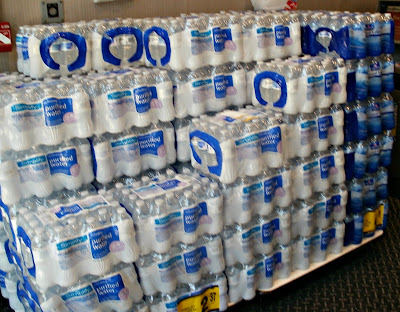The response of the population who can afford it is to buy as much bottled water as possible. Or at the very least have items like Brita and Pur water filter systems and pitchers..
The water starts out just fine in the upstate reservoirs, but once going through all the aging pipes of say, lower Manhattan, it is carrying who knows what contaminants in it.
There was a big story back in the late 1980's how parasites in the water were especially dangerous to all the people in the East Village who were HIV positive.
The first late night NYC radio show I used to listen to on a regular basis and then its successor both had this Great Bear spring water as sponsor. Then the Perrier craze came along and also knock offs like Evian water...
The consensus is that Poland Spring water has the most....cachet.
You see the little bottles sticking out of holders on people of all kinds, out of or on backpacks, etc.
Usually in any subway car I see a least one person with a bottle of Poland Spring...
My little contribution to this is that a doctor instructed me to either drink bottled water or get a Brita pitcher ( he had one)...and I had no condition that would have made me vulnerable to any small amount of contaminant in the water.
For what its worth, all the doctors I have asked also tell me they themselves drink as much bottled an filtered water as possible.
Laboratory tests have been done on all these bottle waters...let me see if there is anything on the internet about this whole topic-- here is review and info from one website
How drinkable is New York City’s tap water?
Originally Published: October 1, 1994 - Last Updated / Reviewed On: June 8, 2012
|
Share this |
Alice,
How bad is the water here in New York City? Do you recommend drinking filtered water, or does it really make a difference?
Thirsty
Thirsty
Dear Thirsty,
You assume New York City water is bad, but in fact, it's quite good! The NYC Department of Environmental Protection (NYCDEP) rigorously tests the city's tap water and reports their findings to the public annually. (For the official report, visit the DEP's water quality page.) By most counts, the quality of NYC's tap water is something to drink to!
In particular, three of the major culprits for drinking water contamination are lead, bacteria, and disinfectants or disinfectant byproducts. New York City stacks up pretty well in terms of each of them.
For more information on local water quality, call the U.S. Environmental Protection Agency's (EPA) Safe Drinking Water Hotline at 1.800.426.4791.
You assume New York City water is bad, but in fact, it's quite good! The NYC Department of Environmental Protection (NYCDEP) rigorously tests the city's tap water and reports their findings to the public annually. (For the official report, visit the DEP's water quality page.) By most counts, the quality of NYC's tap water is something to drink to!
In particular, three of the major culprits for drinking water contamination are lead, bacteria, and disinfectants or disinfectant byproducts. New York City stacks up pretty well in terms of each of them.
- New York City's water supplies are virtually lead-free. There is the possibility that lead can leach into water from old plumbing, but sampling indicates that the vast majority of NYC taps produce water containing only minute, insignificant quantities of lead (if any). Those worried that their tap might be among the very few with dangerous lead levels can call 311 for a free testing kit.
- Although the common bacteria Giardia and Cryptosporidium have been detected in some water samples, there is no evidence that these bugs have caused any illness among New Yorkers. The DEP acknowledges the potential risk of gastrointestinal infection due to these water-borne bacteria, but maintains that this risk is very minor. For details related to the ongoing monitoring of Giardia and Cryptosporidium, visit NYCDEP's Waterborne Disease Risk Assessment Program.
- All NYC drinking water is treated with chlorine (to kill harmful bacteria and viruses), as well as fluoride (to help prevent tooth decay) and orthophosphate (to help prevent metals, including lead, from being released from plumbing). Some studies report that over a period of decades, exposure to chlorine and its byproducts are associated with an increased risk for certain types of cancer. However, this risk is relatively small compared to those associated with non-chlorinated water.
For more information on local water quality, call the U.S. Environmental Protection Agency's (EPA) Safe Drinking Water Hotline at 1.800.426.4791.

No comments:
Post a Comment
Please leave a comment-- or suggestions, particularly of topics and places you'd like to see covered